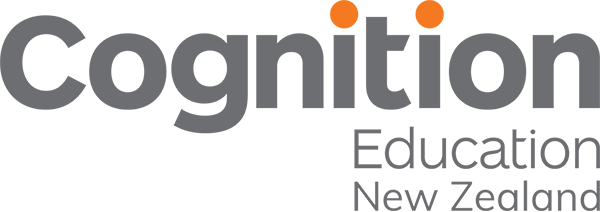Assessment Professional Development
Supporting NZ teachers to enhance learning through good assessment practices.
Ministry of Education funded Assessment PLD
Strengthen assessment capability in ways that are purposeful, evidence informed, and aligned to the New Zealand Curriculum.
Cognition Education provides tailored support across a twelve month period. Every programme is co-designed with your school to reflect your priorities, context, and learners.
Our PLD is grounded in the Best Practice Assessment Guidance and builds teacher and leader confidence with tools such as SMART, e-asTTle, PAT, phonics checks, writing samples, and DIBELS. Schools develop clarity, consistency, and shared expectations so progress is visible across learning areas.
We encourage schools to apply for Ministry funded PLD now. Once funding is confirmed, we work with you to design a delivery model that fits your needs.

Transforming Education with Culturally Responsive Assessment
Relationships First is an evidence-informed wrap-around framework that works to increase equity through transforming classroom, leadership, and system practices, creating a culturally responsive context for learning.
Central to this transformation is a focus on assessment for learning, ensuring that all students, particularly indigenous and marginalised learners, receive the feedback and support they need to achieve their full potential.
Since 2012, in New Zealand | Aotearoa we have worked with 16 Kahui Ako , 175 schools and 3,850 teachers – impacting approximately 50,000 students.

Data-Led school success
A transformative short course for school leaders to embed data-informed decision-making and drive ākonga achievement.
Data-Led School Success (DLSS) is a practical and impactful short course designed for school leaders and their teams. It fast-tracks school-wide improvement by embedding data-informed practices into everyday decision-making.
Across four interactive sessions, participants will work directly with their own school’s data to:
- Understand the relationship between achievement data and broader outcomes.
- Evaluate current data practices and apply effective analysis protocols.
- Prioritise challenges using the Collaborative Impact Approach.
- Develop actionable plans aligned with Annual and Strategic Plans.
- Create systems for monitoring, evaluation, and sustained progress.
With expert guidance, proven tools, and access to research-based resources, DLSS equips you to lead with confidence and foster a culture of continuous improvement.
Find out more and enquire here.

School Funded PLD
Explore our range of assessment offers available now.
These PLD opportunities can be delivered individually or combined into a school-specific bundle. Each is co-constructed with leadership and staff to align with Te Mātaiaho, He Pikorua, and current Ministry initiatives, supporting schools to use assessment as a lever for coherence, clarity, and accelerated progress across the curriculum.
Assessment for Learning Foundations
Reframe assessment as a process that supports learning, not a product of it.
This professional learning opportunity supports leadership teams and teachers to reconnect assessment purpose with practice in light of Te Mātaiaho, He Pikorua, and current Ministry initiatives. It explores how assessment informs responsive teaching across the curriculum and within all tiers of support, helping schools use evidence to identify strengths, target needs, and adapt instruction for every learner.
The professional learning is co-constructed with each school to reflect local priorities and current assessment practice. It also offers an insight to the SMART assessment tool (included in this PD from Term 2 2026) and supports schools to plan how this can sit alongside existing diagnostic and formative approaches.
Schools develop a shared understanding of assessment as an ongoing, multi-tiered process that drives coherence, clarity, and continual improvement across teaching and learning.
Data That Drives Teaching
Move from data collection to data connection.
This professional learning supports teachers and leaders to strengthen their confidence and capability in interpreting assessment information and using it to design purposeful, next-step instruction. Through a co-constructed approach with each school, teams explore how to identify meaningful patterns in data, link evidence to Te Mātaiaho progressional descriptors, and design responsive learning pathways that meet the needs of all learners.
The focus is on developing collective efficacy; building a shared belief that teacher actions make a measurable difference. Facilitators work alongside staff to model and embed data-informed practices that turn insight into impact. Schools learn to create and sustain data conversations that are collaborative, reflective, and action-oriented, ensuring that assessment outcomes translate into deliberate changes in teaching and learning design.
This PLD supports schools to establish a culture where assessment is not a compliance task but a driver of professional inquiry, curriculum alignment, and equitable learner progress.
Building Your Assessment Schedule
Simplify your school’s tools and timing providing your team with clarity over compliance.
This professional learning supports leadership teams and curriculum leaders to audit, align, and streamline assessment practices across the curriculum, ensuring every tool has a clear purpose and connection to learning. The process is co-constructed with each school, drawing on local context, values, and priorities to design an assessment system that reflects Te Mātaiaho, He Pikorua, and culturally responsive approaches to teaching and learning.
Grounded in the principles of Teaching to the North-East (Bishop, 2019), this PLD emphasises relationships, agency, and efficacy, supporting leaders to create assessment systems that affirm learner identity, build trust, and strengthen teacher–student partnerships.
Leaders and teams work collaboratively to:
- Review current assessment tools and their purposes across learning areas through a culturally responsive lens.
- Identify duplication, gaps, and misalignment between assessments, planning, and reporting.
- Map assessment practices to the phases of Te Mātaiaho and the tiers of support within He Pikorua.
- Co-design a balanced, purposeful assessment schedule that supports responsive teaching and equitable outcomes.
- Develop shared accountability processes that encourage relational trust and collective responsibility for learner progress.
This PLD builds leadership capability to ensure assessment systems reflect partnership, high expectations, and responsiveness. The outcome is a coherent, future-focused assessment approach where evidence informs teaching, honours diverse learner identities, and strengthens collective efficacy across the whole school.
Assessment in the English Learning Area
Strengthen confidence and coherence in English assessment; from early language foundations to critical interpretation and creation of texts.
This professional learning supports teachers and leaders to design and implement assessment practices that reflect Te Mātaiaho and the intent of the refreshed English curriculum, ensuring that assessment is purposeful, equitable, and informs responsive teaching. The work is co-constructed with each school to reflect local priorities, year-level contexts, and classroom realities.
Teachers and leaders explore how to:
- Align assessment practices with Te Mātaiaho and the English Learning Area’s focus on meaning making, language knowledge, and identity, culture, and voice.
- Select and use tools that capture growth in oral language, reading, writing, viewing, and presenting across phases of learning.
- Design formative and diagnostic opportunities that directly inform explicit teaching within structured and disciplinary literacy contexts.
- Integrate observational, conferencing, and portfolio approaches that make progress visible to learners, whānau, and kaiako.
- Embed culturally sustaining and inclusive assessment practices that value multiple literacies, languages, and ways of communicating.
- Connect evidence of learning against progress indicators to plan, report, and track growth across the learning pathway.
Schools develop a connected, coherent assessment pathway across the English Learning Area. Teachers confidently gather and interpret evidence that reflects the full scope of communication; from foundational decoding and oral expression to independent interpretation and text creation, supporting learner progress, identity, and agency at every phase.
Assessment in the Mathematics and Statistics Learning Area - Across the Phases
Strengthen coherence and confidence in assessment across the Mathematics and Statistics learning area, from foundational number sense to abstract reasoning and problem solving.
This professional learning supports teachers and leaders to design and implement assessment practices that align with Te Mātaiaho and reflect the intent of the refreshed Mathematics and Statistics curriculum. The work is co-constructed with each school, ensuring it responds to local priorities, progressions, and learners’ needs.
Teachers explore how to:
- Align assessment practices with Te Mātaiaho progressions from foundational numerical concepts through to proportional, multiplicative, and algebraic reasoning.
- Use diagnostic and formative assessment tools to identify next learning steps and inform targeted teaching.
- Design classroom-based assessment opportunities that capture learners’ reasoning, strategy use, and mathematical communication.
- Link assessment insights to differentiated instruction across He Pikorua tiers, ensuring all learners experience success.
- Embed culturally responsive and relational approaches that value diverse mathematical thinking, promote equity, and build learner identity as mathematicians.
- Connect evidence of learning against progress indicators to plan, report, and track progress across year levels.
This PLD helps schools build a connected assessment pathway in mathematics, ensuring assessment is purposeful, consistent, and responsive, driving teaching that develops both fluency and deep conceptual understanding.
Designing Moderation that Matters
Make moderation purposeful, consistent, and time well spent.
This professional learning opportunity supports schools to reimagine moderation as a powerful process for collective professional growth rather than a compliance activity. Through a co-constructed approach, teachers and leaders develop the shared language, trust, and professional capability needed to make confident, consistent assessment judgments across the curriculum.
Moderation is explored through the lens of Te Mātaiaho progressions and exemplars, ensuring alignment with current curriculum intent and phase-based expectations. Schools engage in practical, collaborative moderation experiences that strengthen understanding of what progress and quality look like at different phases and across disciplines.
Facilitators work alongside staff to:
- Develop shared criteria and rubrics that reflect Te Mātaiaho descriptors and local priorities.
- Examine anonymised samples to calibrate expectations and strengthen inter-rater reliability.
- Use moderation as an opportunity for rich professional dialogue, reflection, and feedback.
- Build sustainable moderation systems, digital or in-person, that embed ongoing teacher learning.
- Link moderation outcomes directly to teaching design, planning, and reporting processes.
This PLD builds collective efficacy and confidence in making defensible, curriculum-aligned judgments. It supports schools to establish moderation practices that are relational, transparent, and genuinely transformative, ensuring assessment evidence drives both teacher growth and learner progress.
Accelerative Assessment Practice
Use assessment to drive accelerated progress for priority learners.
This professional learning opportunity supports schools to apply assessment as a strategic tool for responsive intervention design and progress monitoring across the curriculum. Drawing on the intent of Te Mātaiaho and the principles within Learning in the Fast Lane (Suzy Pepper Collins), this PLD focuses on how targeted, evidence-informed practice can lift achievement rapidly and sustainably for learners who need it most.
Working collaboratively with teachers and leaders, facilitators support schools to:
- Identify learners requiring Tier 2 and Tier 3 support using a range of diagnostic tools and formative evidence across the English and Mathematics learning areas.
- Analyse patterns in achievement data to uncover the root causes of learning barriers, whether in foundational knowledge, language demands, or conceptual understanding.
- Develop micro-goals and progress trackers that make incremental progress visible, measurable, and motivating for both students and teachers.
- Design short-cycle assessment reviews (every 2–3 weeks) to evaluate instructional impact and adjust teaching responsively.
- Connect assessment outcomes directly to explicit, cumulative instruction, ensuring teaching builds from what learners can already do and targets what they are ready to learn next.
- Embed a collaborative culture of inquiry where teachers reflect on the relationship between assessment evidence, teaching moves, and learner progress.
This PLD supports teachers to shift from viewing assessment as a measure of performance to using it as a lever for equity, acceleration, and empowerment. Schools develop a shared system of practice where assessment, instruction, and intervention are seamlessly aligned, ensuring that every learner has the opportunity to catch up and keep up across the curriculum.
Coaching & Mentoring for Sustainable Change and Impact
Sustained improvement doesn’t come from programmes, it comes from people.
Our coaching and mentoring approach grows capability from within, supporting teachers and leaders to embed Te Mātaiaho in ways that directly enhance learner outcomes.
Grounded in the work of Hattie (2012) on visible learning, Bishop (2019) on Teaching to the North-East, and Knight (2021) on instructional coaching, this approach combines the relational with the practical: teachers are supported through cycles of observation, feedback, reflection, and action that turn professional learning into visible classroom change.
Through a blend of professional coaching (building self-efficacy, reflection, and leadership) and instructional coaching (targeting pedagogy, assessment, and classroom practice), teachers and leaders are guided to connect curriculum knowledge with purposeful action that improves learner outcomes.
Our coaching and mentoring approach supports:
- Embedded practice and system coherence – ensuring curriculum understanding becomes everyday pedagogy.
- Relational trust and responsiveness – drawing on Bishop’s evidence that learning accelerates when teachers and leaders engage in authentic, reciprocal, and dialogic relationships.
- Collective efficacy and agency – reflecting Hattie’s finding that collective teacher efficacy has one of the highest impacts on student achievement.
- Sustained growth through reflection – enabling teachers to see, name, and refine their impact through ongoing coaching cycles.
- Aligned assessment practice – integrating evidence and reflection to inform next steps, not as an endpoint but as part of an ongoing learning conversation.
Whether through 1:1 coaching, team mentoring, or leadership partnerships, our facilitators walk alongside schools to build internal capacity for long-term success. In this way, we embody the spirit of Nā tō rourou, nā taku rourou ka ora ai te iwi, by sharing our baskets of knowledge, we enable the whole community to thrive.
The goal is not dependency but confidence, coherence, and capability across the system.
The above list is not exhaustive, we can work with your school on a range of needs, please contact us.
Set up a meeting to discuss, or leave us a question.
Have a question for our assessment experts?
Contact us today!
Ask us a question!
[Subscribe]
Keep up to date with the latest Cognition Education news and events.
By subscribing you consent to us storing your professional data, contacting you regarding our products, services and other content that may be of interest to you. You can unsubscribe at any time. To find out how we manage your data please refer to our Privacy Policy.
Contact
Level 8, 139 Quay Street, Auckland 1010
New Zealand

